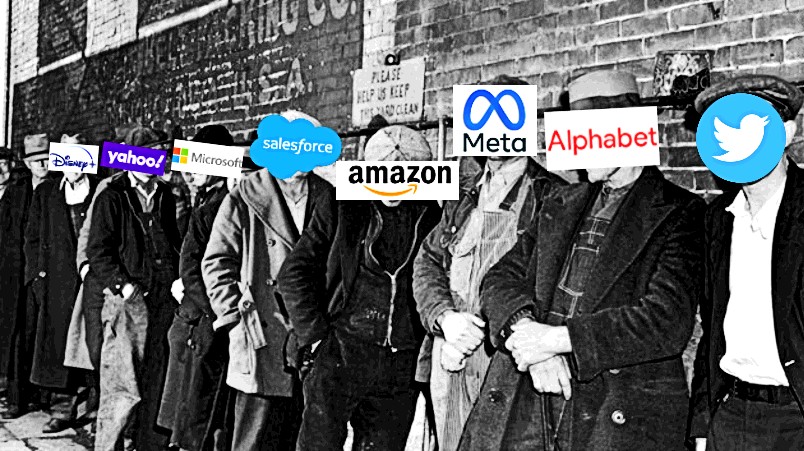Google, Yahoo machete local teams as media talent market cools... but tech’s staff cull has only a small impact on digital talent shortfalls

Red hot, not white hot, but still very bloody hot. As Yahoo all but wiped its ANZ commercial team last week, including the likely exit of APAC CEO Paul Sigaloff, and rumblings of further cuts now underway at Google, the early signs of cooling in parts of the media and agency sectors are on the rise. Mass tech redundancies have "opened up a whole new supply of tech and digital people", says OMG CEO Peter Horgan, although not everyone agrees. The wider tech skills shortage remains and could still see big cheques being written for specialist roles.
What you need to know
- Locally, Google and Yahoo are the latest to wield the axe – Yahoo offloaded almost its entire ANZ commercial team last week as part of another global restructure in which some revenue units have been axed.
- As digital giants from Google to Facebook, Salesforce and Adobe no longer chase cheaper media talent, the demand for sales people is waning. "It's a good time to have a job, there's a lot of good people looking for one" per one media exec.
- But the digitisation of business continues apace, and with it the hunt for specialist digital capabilities.
- Skills shortages are caused by long-running structural problems – the current cyclical layoffs won’t fix them.
- Much of the recently redundant tech talent comes from highly organised, process-rigid environments and may not be a great cultural fit for agencies, media and non-technology companies – except for those returning to their original gigs.
- Perks and concessions are are now under some pressure, particularly for the media and agency sectors: "Flexibility concessions that went with the talent boom are moving to a more neutral, sustainable setting," per Omnicom Media Group boss Peter Horgan.
Agencies need people with battle scars, they don't need people that come from a Facebook where everything is organised and revenue just flows in.
Google and Yahoo are the two latest companies in the past week from the ranks of the global tech sector to take a scythe to their Australian operations following restructuring warnings from head office.
Once they have both hacked their way through their respective human lantana, the local pool of available tech and media talent will swell further.
But interestingly, while media companies say finding sales and marketing staff is easier than even three months ago, brands trying to transform their customer experiences through digital transformation programs and the agencies who want to make money helping them, are not seeing the same effect for large pockets of digital expertise.
That’s because tech talent shortages in Australia are caused by long-term structural problems welded into the economy over decades, rather than by just the latest cyclical upheaval.
Industry leaders we spoke with believe tech sector redundancies will do little to cool the red-hot market for specialist digital talent. But as the digital ad market in Australia slumped 10 per cent in December, per SMI data, it appears January and February are down on the same period last year, triggering angst for publishers and adtech players.
Bring out your dead
Neither of the latest tech sector high priests currently offering wetware sacrifices to the gods of finance was willing to discuss any specifics around the scale of the local cuts. In fact, Google ANZ was unwilling to comment at all but did not deny that seven per cent of its staff were told late last week it was time to pack up a cardboard box and collect their cab charge on the way out the door.
The seven per cent figure provided by industry sources to Mi3 is broadly in line with the six per cent reduction globally, flagged by Alphabet’s corporate HQ in January. The cull in Singapore is believed to be higher – perhaps as much as 12 per cent, but again Google declined to comment, instead referring us to a blog from January by CEO Sundar Pichai that begins, "I have some difficult news to share."
Yahoo at least acknowledged through a spokesperson that it is consulting with staff who may be affected by changes. (Australian enterprise agreements require employers to maintain a legal fiction that no decisions have been made about redundancies until after consultations about this fait accompli are complete.)
However, in a statement Yahoo confirmed that it is effectively abandoning plans to build a unified adtech stack, and will focus instead on its demand-side platform.
Reports suggest that senior executives in Australia including APAC Regional chief Paul Sigaloff are set to depart, although this could not independently verified at the time of publication.
A company spokesperson said that despite years of investment the current strategy was not profitable.
"We will sunset our SSP, while fully shifting our native efforts to the 30-year partnership with Taboola that was announced in November," they said.
Instead, Yahoo will narrow its focus and future investments solely on its DSP business, which it claims has a strong market position and high-growth potential.
"The new division will be called, simply, Yahoo Advertising. In redoubling our efforts on the DSP on an omni-channel basis, we will prioritise support for our top global customers and re-launch dedicated ad sales teams towards Yahoo's owned & operated properties (including Yahoo Finance, Yahoo News, Yahoo Sports, and more).
We will sunset our SSP, while fully shifting our Native efforts to the 30-year partnership with Taboola that was announced in November.
However, one senior executive with knowledge of the layoffs told Mi3 it would be incorrect to characterise cuts as only affecting the SSP and ad exchange business, “It’s wider than that.”
The news out of the local Google and Yahoo branches is just the latest example of wholesale cuts to the Australian arms of tech sector giants.
But while upheavals at companies such as Salesforce, Microsoft and Amazon among others will increase the pool of talent available in the tight Australian market, it is unlikely to dramatically shift the balance between company and candidate for businesses looking to digitally transform their operations.
Media softens
There are some exceptions. On the media side, for instance, capable sales staff may be more freely available.
Southern Cross Austereo Chief Sales Officer, Brian Gallagher said: “There's been a massive turnaround in the volume of applications for any open role. It's way better now than what it was a few months ago for hiring. A lot of good people are looking for work.”
Meanwhile Gallagher's SCA colleague, Chief People & Culture Officer, Rebecca Ackland, offered a perspective on the wider business. “We have seen a reduction in candidates receiving multiple employment offers at once and an increase in candidates prioritising culture, work life balance and purpose-driven work when looking for a new opportunity."
In the coming year the company expects to invest further skills for software, digital technology, podcasting and video skills, as it continues to invest in its digital audio platform, LiSTNR.
Over at Pedestrian CEO Matt Rowley tells a similar story. “One of the biggest things that we've noticed, maybe a year ago, was tech moving into media with much more aggressive salary bands and that’s definitely cooled off.”
Another media executive who did not want to be named said as some parts of the media market tightens the balance is shifting, “Where we were getting no applications for a role, we're getting 30, 40, 50 applications now.”
Beyond the now booming out-of-home sector, many media businesses face a challenging short-term outlook.
“Everybody's turning themselves inside out for revenue growth and coming up with one or two per cent or, if you're [in] television, minus twelve per cent is the outlook for this quarter, minus ten is the outlook for the year,” another media executive said. Still, apart from the layoffs announced last week at News Corp, the larger local media companies indicated to Mi3 there are no plans for net new hires in many parts of their business – but no layoffs currently on the horizon.
A live indication of a cooling in parts of the media and agency sector is fresh data from the Media Federation of Australia. In two years, media agencies have added 25 per cent to the sector's workforce – now about 5,000. Vacancy rates at 7.5 per cent - they peaked during Covid around 12 per cent - remain above historical norms of 6 per cent, "but there's definitely been some cooling," said MFA CEO Sophie Madden.
IAB CEO Gay Le Roy concurs: "Unfortunately, we have seen a range of layoffs across the industry over the last month as well as a slowdown in the number of open roles," she says. "There is a mixture of drivers with global tech workforce adjustments, companies cutting costs preparing for economic slowdown as well as some organisations that may have expanded their workforce a little too quickly at the back end of last year. We are seeing a slowdown in entry level positions as well as some consolidation at senior levels. There is still demand for specialists with around three-to-five years’ experience."
You only have to speak to any business leader undergoing a digital transformation effort to appreciate that tech and digital skills remain in short supply.
Tougher in transformation
However, in the realm of digital transformation – away from more traditional media skills – talent remains a tough game for brands and the agency-consultancy supply chain.
That’s because the underlying structural reasons for demand have not fundamentally altered. Perhaps the first most important point to understand is how small this current wave actual is in the overall context of global technology growth. As Professor of Marketing at NYU Stern School of Business has pointed out on several occasions, Microsoft, Google, Meta and Salesforce have given up only about 25 per cent of the roles they added after the pandemic began.
Another crucial factor. Australia is still a net importer of tech talent and always has been.
According to Bridget Gray, Senior Client Partner, at executive recruitment firm Korn Ferry, “As a nation, opening our borders has certainly broadened our options in regard to the accessibility of skills with many organisations feeling more optimistic around addressing their ever-widening skills gap.
“It is however important to understand that Australian borders opening up does not in itself solve our significant digital/tech skills shortage."
Gray told Mi3: "You only have to speak to any business leader undergoing a digital transformation effort to appreciate that tech and digital skills remain in short supply. This shortage is financially impeding Australian organisations and impacting the delivery of major change programs.”
Cybersecurity, data, and AI skills are particularly problematic, she says.
“We continue to see a critical demand in specialist technical roles including DevOps, Data, Cyber. The requirement for multi-disciplinary digital and technology professionals remains strong.”
Gray, one of the country's most experienced technology executive recruiters, says while there has been a cooling in some traditional IT infrastructure roles, the current state of play represents only a small decrease off an unprecedented demand peak.
“There is no doubt that tech and digital skills will remain in demand for the foreseeable future, and we must not confuse more [candidate] options with our nation's skills market being solved.”
A retreat, not a rout
So if consumers are demanding better customer experiences and businesses are still driving digital innovation agendas, why are technology companies wracking up the body count so aggressively?
The answer goes a long way to explaining why the current wave of redundancies is unlikely to change the long-term balance between employer and candidate.
When the world first went into Covid lockdown, it triggered a huge acceleration of digitalisation as brands were forced to meet customers in the only channel that was then available – online. And this was on top of two decades of disruption.
That it happened everywhere in the world all at once amplified the skills crunch dramatically. Talent may be mobile but it can’t be in two places at once.
Management consultants McKinsey famously reported that on average their corporate clients experienced seven year's worth of digital transformation in just the first six months of the pandemic. And there was little respite for many businesses in the years that followed.
As a result, tech stocks soared, and tech salaries followed as digital giants waged an aggressive war for the staff.
Agencies, consultancies and media companies proved a happy hunting ground for the tech sector with its very deep pockets and a “whatever it takes” attitude to riding the growth curve.
It wasn’t just MAANGA (Meta, Apple, Alibaba, Netflix Google and Amazon). A whole generation of fast growth scale-ups in emerging sectors such as martech, ecommerce, and analytics funded their growth through cheap money courtesy of the US Federal Reserve, as others had done before during the GFC, and then later in the Asian financial crisis.
It seemed like an unbeatable idea right up until the moment it beat them to death.
Interest rates spiked to counter the inflation caused by an economic stimulus designed to defeat a Covid depression and by supply chains broken by Covid.
In our life time there’s probably never been such a confluence of events as we have seen in 2022.
After that, everything started turning to custard everywhere, all at once.
As Singapore-based investment banking firm North Ridge Partners (NRP) described it, markets experienced a bevvy of black swan events.
Speaking on a company podcast, NRP founder Roger Sharp who also chairs several ASX-listed companies including Webjet and Iress, said, “In our life time there’s probably never been such a confluence of events as we have seen in 2022.”
“We’ve had so many other crises to deal with. We’ve had a climate change crisis, we’ve had an energy transition in full swing, we’ve had a war in Europe exposing Europe’s reliance on Russian fossil fuels, we’ve had sabre rattling in the Straits of Taiwan putting pressure on the global semi-conductor industry, we’ve had the bursting of the crypto bubble and last but not least we’ve had a tech meltdown reminiscent of the tech wreck of 2000.”
Thus ended the latest tech boom as companies suddenly found themselves needing to demonstrate some rather quaint business qualities such as sustainable EBITDA, or at least a believable path to profitability.
Soylent green is people
The sector's answer was as predictable as it was depressing for any employees on the wrong list. It was time to unwind the excesses of the boom, starting with headcount.
Staff dropped like Dogecoins. Amazon (18,000), Alphabet (12,000) Microsoft (10,000), Salesforce (8,000) SAP (2,800) now Yahoo (1,600) are just some of the headline numbers of redundancies.
(Twitter under Elon Musk is a whole PhD all to itself).
It's also true that tech isn’t the only sector where businesses are wielding the axe as cuts at Disney (7,000 jobs), and News Corp (1,250) attest. Yet for the media and content sectors those cuts aren’t ubiquitous, yet.
Other local media businesses we spoke with including Nine and SCA said there were no major redundancy programs underway.
While it’s tempting to believe the tech retreat will restore equilibrium to the market for digital skills, it's not happening.
According to Jules Hall, CEO of full service agency The Hallway, “We've got 10 new roles that we're hiring for at the moment. We’re pretty active in the market and we're much more active now than we were this time last year. But I think the view of our head of talent is that it [the talent market] hasn’t actually eased off yet.”
It's not just The Hallway’s own circumstance, he said.
“When I talk with some of our clients, I think they're struggling, particularly in the digital transformation space. You can get hold of people, but can you get hold of the right people?”
Nor will the recent wave of redundancies suddenly necessarily offer any respite. The kind of people who thrive in highly structured, near-cult environments of companies such as a Facebook, Google or Salesforce can often struggle in other environments say recruiters.
According to Kees de Jong, founder and managing partner at Uncommon People, a specialist adtech and martech recruitment and talent management consultancy: “Often these candidates, whilst really highly qualified and competent and all those great things, they come from an environment that is super highly structured, where they play a very specific role."
He contrasted that with agencies which he said are very ambiguous at the best of time, or publishers which are often fighting over the scraps that Facebook and Google leave behind.
“Agencies need people with battle scars, they don't need people that come from a company like Facebook where everything is organised and revenue just flows in."
De Jong also said that the kinds of 25-50 per cent premiums that were being paid last year are still around, but that he suspects a change is coming.
We learned nothing
In a market like Australia where many redundancies are in business development, sales and marketing, the impact on available tech talent could be negligible. Instead, the fact that the digital giants and scale-ups have withdrawn from the hiring game is of more importance – for now.
The digital sector is unlikely to leap back into the employment market aggressively until the current wave of corrections washes through and earnings multiples start to look a little more rational.
Yet we are already getting hints that the next tech skill bubble is starting to inflate around artificial intelligence and the related data and analytics sectors.
The technology industry rarely pauses, and especially not to mourn over the corpse of the last good idea, or the broken careers of its true believers.
Clarification: In the What you need to know section, an earlier version of the story said Yahoo fired its entire commercial team. We have updated this to reflect new information. A Yahoo spokesperson citing the ongoing process of staff consultation, declined to provide actual numbers remaining saying only that it was "more than one."



